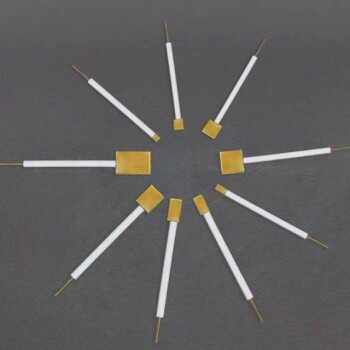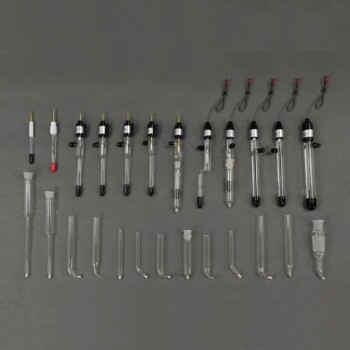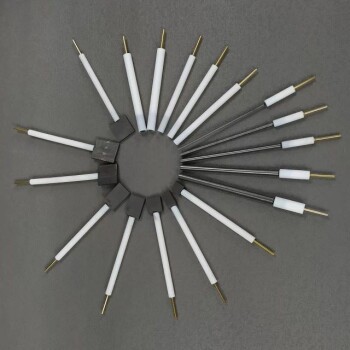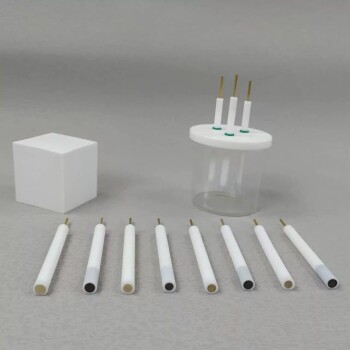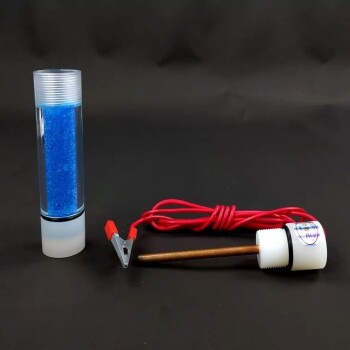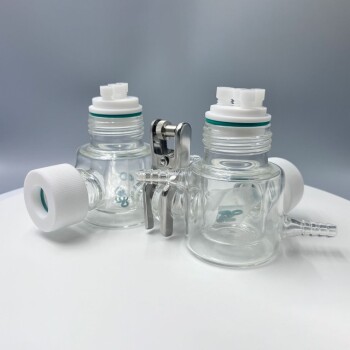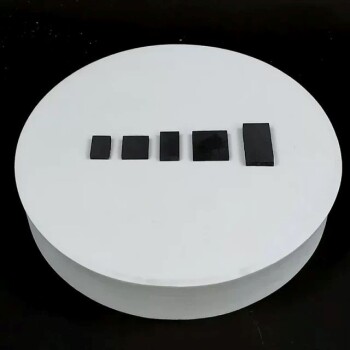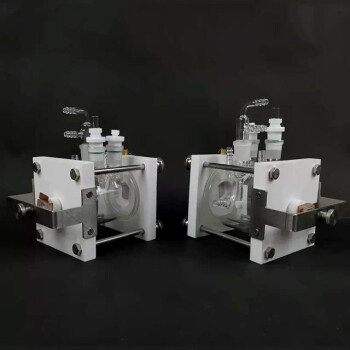In principle, a platinum wire electrode can last for many years. With proper use and maintenance, its service life is exceptionally long because platinum is a highly inert precious metal. However, its functional lifespan is not measured in time but rather by the conditions of its use, as it is a delicate instrument susceptible to specific forms of damage.
The lifespan of a platinum wire electrode is not a fixed duration but is directly determined by its operating environment and maintenance routine. Its longevity is less about time and more about preventing mechanical damage and aggressive chemical degradation.
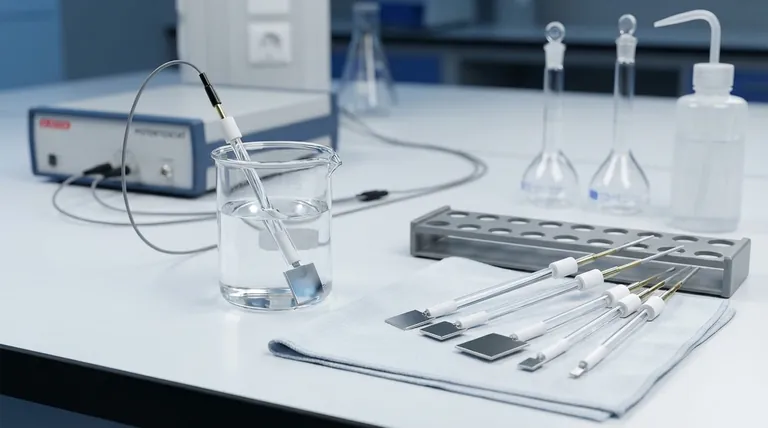
Why Platinum is Built for Longevity
The inherent properties of platinum make it an ideal material for a durable electrode, provided it is handled correctly. These characteristics are the reason it is a staple in electrochemical research.
Unmatched Chemical Inertness
Platinum is chemically stable and possesses strong corrosion resistance. It remains largely unaffected by harsh electrolytes, including strong acids and strong alkalis, which would quickly destroy lesser materials.
High-Temperature Stability
This material maintains its structural and electrical integrity even at high temperatures. This provides stable, reliable performance for experiments conducted in heated environments.
Excellent Electrical Conductivity
As a noble metal, platinum is a highly effective conductor. This ensures that it can efficiently transfer charge as a counter electrode or working electrode without introducing significant electrical resistance into the system.
Understanding the Factors That Reduce Lifespan
While chemically robust, a platinum electrode is not indestructible. Its longevity is directly threatened by a few key factors that every user must understand and mitigate.
Mechanical Stress and Damage
A platinum wire electrode is delicate and fragile. This is its primary vulnerability. The most common cause of failure is not chemical corrosion but physical breakage from being dropped, bent excessively, or mishandled during cleaning or setup.
Surface Contamination (Fouling)
During experiments, reaction byproducts or components from the electrolyte can deposit onto the platinum surface. This process, known as fouling, can passivate the electrode, blocking its active surface and rendering it ineffective even though the wire itself is intact.
Aggressive Electrochemical Conditions
While platinum is inert, it is not entirely immune to all chemical attack. Certain conditions can slowly dissolve or alter the platinum surface:
- Complexing Agents: Solutions containing high concentrations of ions like cyanide or chloride (especially in oxidizing acids, forming aqua regia) can slowly dissolve platinum.
- Extreme Anodic Potentials: Applying a very high positive potential for prolonged periods can lead to the formation of platinum oxides on the surface, which can change its electrochemical behavior or even flake off over time, causing a gradual loss of material.
The Keys to Proper Use and Maintenance
"Proper use and maintenance" are not just recommendations; they are the essential procedures for ensuring a long service life.
Handle With Extreme Care
Always treat the electrode as a precision instrument. Avoid any impacts, sharp bends in the wire, or abrasive contact with other hard surfaces. This is the single most important factor for longevity.
Clean After Every Use
Immediately after an experiment, rinse the electrode thoroughly with deionized water or an appropriate solvent to remove any residual electrolyte. This prevents residues from drying and hardening on the surface, which makes them much more difficult to remove later.
Ensure Correct Storage
Store the electrode in a dry, ventilated place, away from corrosive fumes or other chemicals. To prevent physical damage, especially to the delicate connection point, it is highly recommended to store it in its original protective box or a dedicated holder.
Maximizing the Life of Your Electrode
Your approach to care should match your experimental goals. By understanding the primary risks, you can ensure your electrode remains a reliable tool for years.
- If your primary focus is routine analysis: Careful handling and immediate post-experiment cleaning are your most critical tasks to ensure consistent, repeatable results.
- If you are working in harsh environments (strong acids/bases): Rely on platinum's inherent inertness, but always visually inspect the wire for surface changes or deposits after each use.
- If you are performing novel or aggressive electrochemistry: Be aware that certain potentials or reactants can slowly degrade the platinum, and factor in the need for periodic surface polishing or eventual replacement.
By treating your platinum electrode as a precision instrument, you ensure its reliability and longevity for countless experiments to come.
Summary Table:
| Factor | Impact on Lifespan | Key Takeaway |
|---|---|---|
| Chemical Inertness | Very High | Resistant to strong acids and bases. |
| Mechanical Stress | Very High | Handle with extreme care to avoid breakage. |
| Surface Fouling | High | Clean immediately after each use to prevent passivation. |
| Aggressive Electrochemistry | Moderate | Avoid extreme potentials and complexing agents like chloride. |
Ensure your lab's precision and longevity with KINTEK's premium platinum electrodes.
As a specialist in high-quality lab equipment and consumables, KINTEK understands that the reliability of your electrochemical data depends on the integrity of your tools. Our platinum electrodes are crafted for superior performance and durability, but even the best equipment requires proper care to maximize its service life.
Let our experts help you select the right electrode for your specific application and provide guidance on best practices for maintenance. Protect your investment and achieve consistent, accurate results experiment after experiment.
Contact KINTEK today to discuss your laboratory needs and learn how our solutions can enhance your research.
Visual Guide
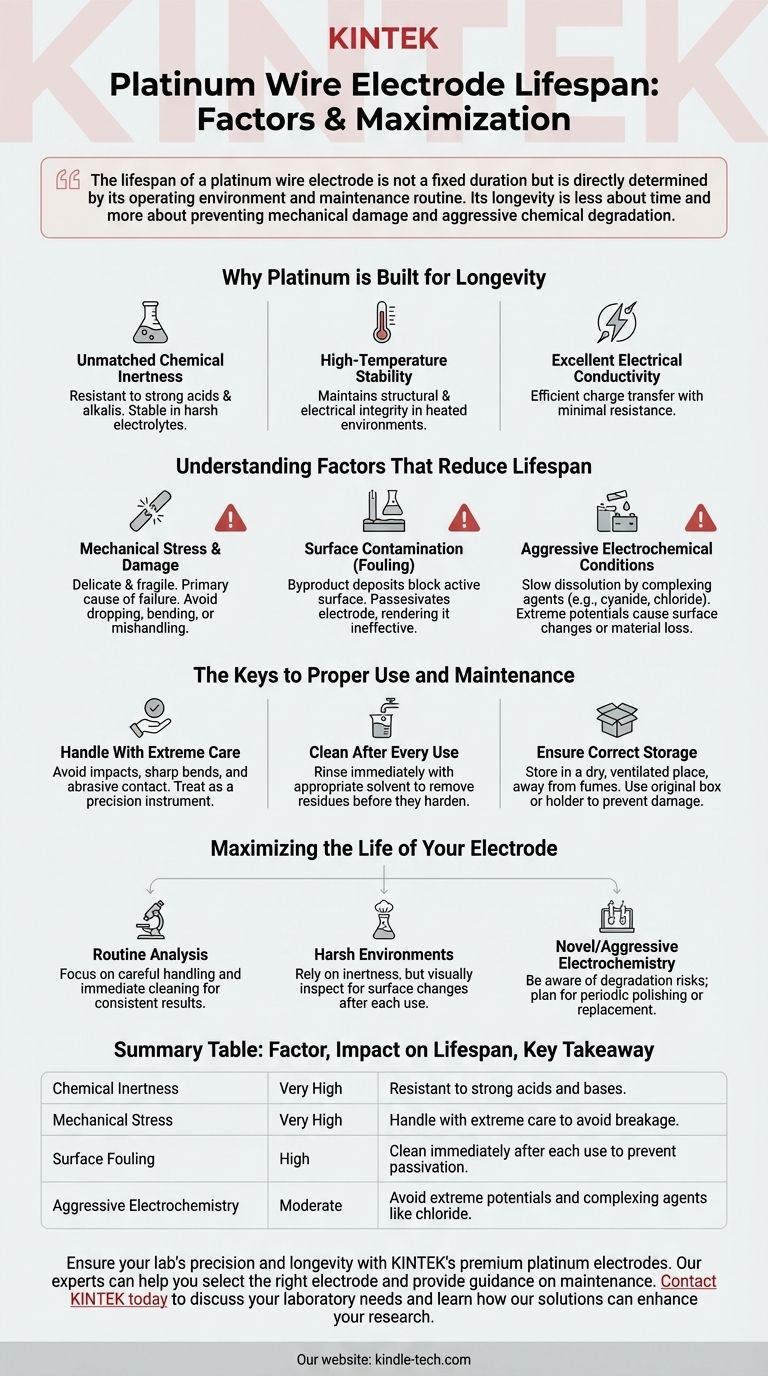
Related Products
- Platinum Sheet Electrode for Laboratory and Industrial Applications
- Rotating Platinum Disk Electrode for Electrochemical Applications
- Platinum Auxiliary Electrode for Laboratory Use
- Gold Disc Electrode
- Gold Electrochemical Sheet Electrode Gold Electrode
People Also Ask
- What are the performance characteristics of platinum sheet electrodes? Unlock Superior Electrochemical Performance
- What precautions should be taken when using a platinum sheet electrode? Ensure Accurate & Reproducible Electrochemical Data
- What is the most critical guideline for immersing a platinum sheet electrode in an electrolyte? Ensure Accurate Electrochemical Measurements
- What are the available specifications for platinum sheet electrodes? Find the Perfect Fit for Your Electrochemical Needs
- How should a platinum sheet electrode be pretreated before use? Ensure Accurate Electrochemical Measurements




